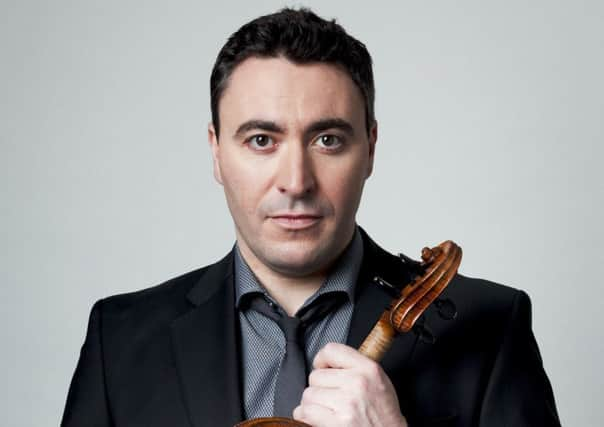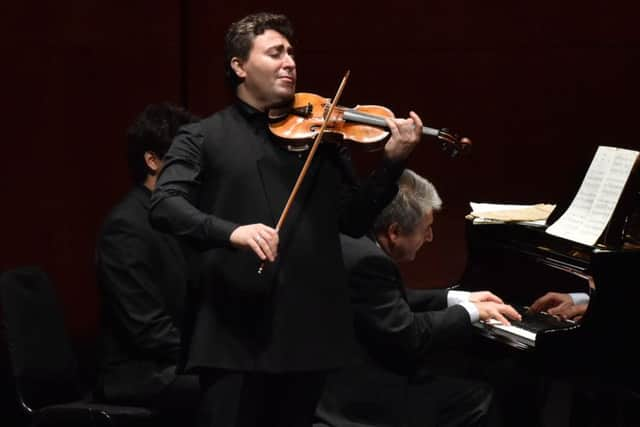Interview: Virtuoso violinist Maxim Vengerov on going back to school to learn the fine art of conducting


He’s been conducting, in fact, since the late 2000s, a time when a shoulder injury forced him to take a break from violin playing. But even before then, he must have had countless requests simply to get up on the podium and brandish a baton. Why did he feel the need to throw himself into formal studies? “I’m an old-school kind of performer,” he chuckles. “If I haven’t studied something, I just can’t do it. I’d break into pieces. There are people who can – people like Bernstein, and he did pretty well! I’m not saying it’s right or wrong. It’s just not for me.”
Scottish audiences can experience both sides of Vengerov’s music making – a rare opportunity in a single concert – when he comes to Edinburgh’s Usher Hall on Sunday, for the finale of the Hall’s Sunday Classics season. On violin, he plays Bruch’s First Concerto, plus Saint-Saëns’s unapologetically flamboyant Introduction and Rondo capriccioso, before grabbing the baton for Shostakovich’s Tenth Symphony.
Advertisement
Hide AdThe orchestra with him, however, might be unfamiliar to many. The Würth Philharmonic is a new band, founded only last year by German businessman Reinhold Würth, and bringing together musicians from all over Europe, indeed the world. And it’s a band that Vengerov himself rates highly. “I performed with them last year – Tchaikovsky’s Pathétique Symphony – which was a great success,” he says. “I’m really looking forward to it.”


For orchestral musicians, having a professional violinist as conductor is an unusual experience. “I think it makes quite a difference when they know someone who actually plays is on the podium,” Vengerov agrees. “It’s a colleague of theirs. I know they have issues, and I know what they might be going through, and they know that I know.”
Since his embrace of conducting, he even notices a difference in his own playing. “I was lucky as a violinist to work with many great conductors – Daniel Barenboim, Riccardo Muti, Lorin Laazel, Zubin Mehta, and Mstislav Rostropovich who was my mentor for many years.” With Barenboim and Rostropovich in particular – both starry soloists before their moves into conducting – he noticed a new approach. “Their playing was orchestral in its vision. In a concerto, they viewed the solo part as emerging from the orchestra, rather than our normal perspective of a soloist with an orchestral accompaniment.”
That’s a fundamentally different outlook. How has it changed his own approach to playing a concerto? “As a soloist, if you don’t know the orchestral part inside out, you’re missing so much of the music – and as a result the audience only gets half the experience. Now I can say there was my life before conducting, and my life since I’ve been conducting. When I recorded the Brahms Concerto at the age of 22 with the Chicago Symphony Orchestra and Daniel Barenboim, the performance might have been good violinistically. But musically, I think the recording I’ve just made with the Oxford Philharmonic Orchestra is a completely different experience – because I’ve now conducted so many symphonic works by Brahms.”
The big symphony Vengerov conducts in Edinburgh – Shostakovich’s Tenth – is one of the composer’s most broadly enjoyed works, and understandably so. It’s huge in its ambitions, and can be overwhelming in its cumulative power. “Yes, the Tenth Symphony is very special,” Vengerov agrees. “Shostakovich was originally planning a grand trilogy of war symphonies – Nos 7, 8 and 9 – but as he was writing No. 9, he realised that it just couldn’t be the climax.” That role, says Vengerov, fell to the mighty No. 10.
But it’s also a work – like so much of Shostakovich’s music – that’s controversial in what it might signify. The equally controversial book Testimony – purported to be Shostakovich’s heartfelt outpourings to musicologist Solomon Volkov about the state of his life in Soviet Russia, but approached with scepticism by most musicologists – claims that Shostakovich wrote the savage second movement as a musical portrait of Stalin. Whether that’s true or not, with its driving rhythms and its militaristic bombast that seems to sweep away all resistance, it’s certainly credible.
Advertisement
Hide AdBut should we even be trying to understand Shostakovich’s music in this way? What’s Vengerov’s view on the disputed meanings behind the music of his compatriot? He takes a sober, considered perspective. “With absolute music – like Beethoven, for example – you play it because of the way the music itself works. Shostakovich has been called the reincarnation of Beethoven, because the architecture of his scores is so precise. But on the other hand, there’s another aspect to Shostakovich, which is coded music – the idea that behind it there’s a message. People like to read things into it, and they’ll interpret what they want to interpret about it. But having said that, you can’t avoid saying that Shostakovich was reflecting his times. Whatever he couldn’t say in words, he would say in music – his struggles, his suffering, his compassion, his hopes and his despair.”
The concert is the first in an intensive eight-stop tour of the UK and Ireland. “To be honest, normally I don’t like to perform every day – music needs time to digest,” Vengerov admits. And although once famously a workaholic, such intensive performance is something he’s less used to these days – partly because of his family commitments. He married Olga Gringolts (art historian and sister of fellow violinist Ilya Gringolts) in 2011, and they have two young children. “Believe me, this is even harder than playing or conducting! It’s a different thing altogether.” When we speak, Vengerov is back home with his family for a week. “They like it when I’m at home – or I hope so, anyway! If I didn’t have them, didn’t have that balance, it would be a very different, lonely life. I need that balance now.”
Advertisement
Hide AdWhether it’s between his playing and conducting, or between his musical life and his family life, Vengerov sounds like he’s achieving a new sense of balance all round.
Maxim Vengerov performs with the Würth Philharmonic at Edinburgh’s Usher Hall on Sunday 3 June, 3pm, for tickets (from £12.50), telephone: 0131-228 115 or visit www.usherhall.co.uk